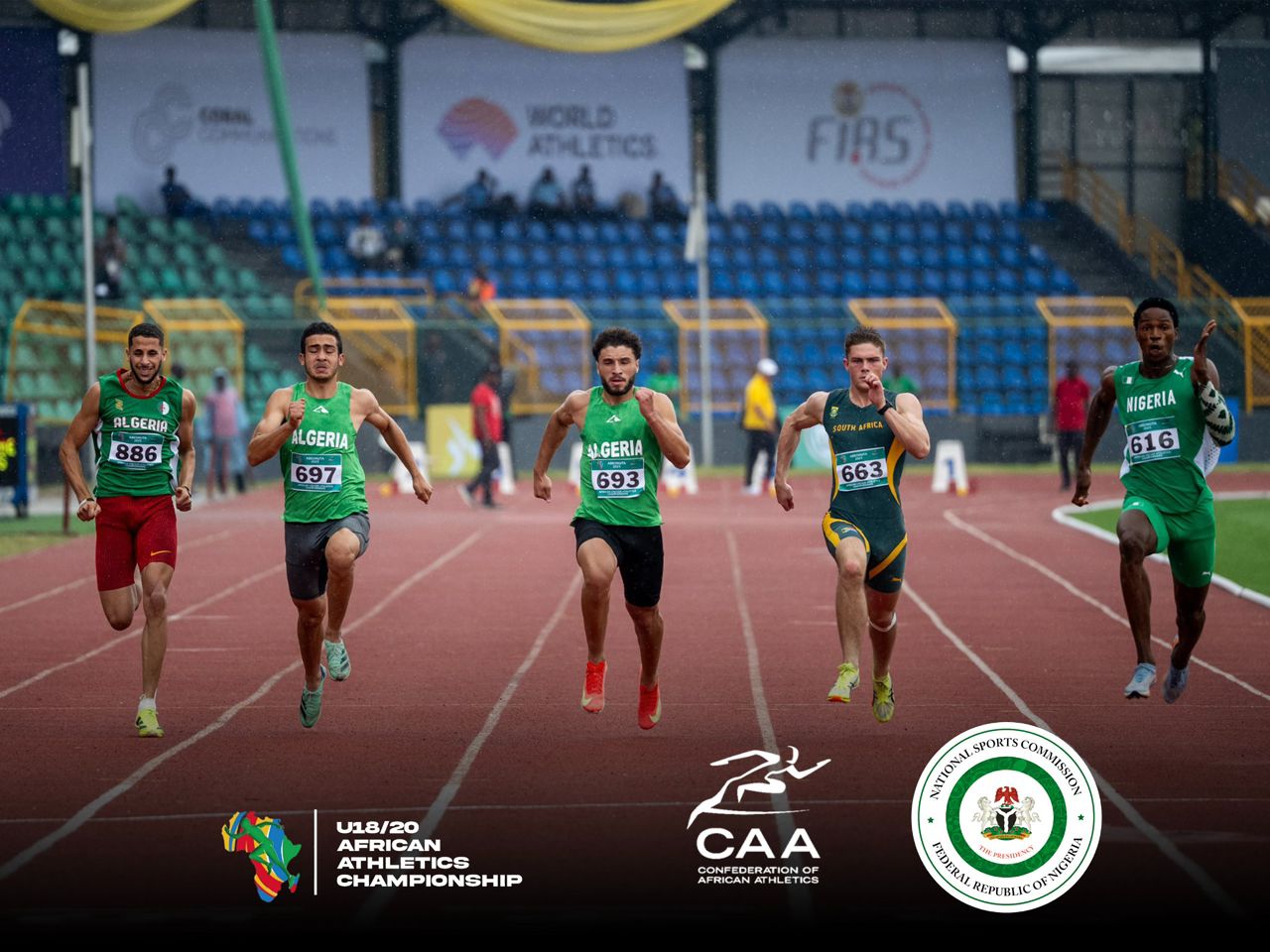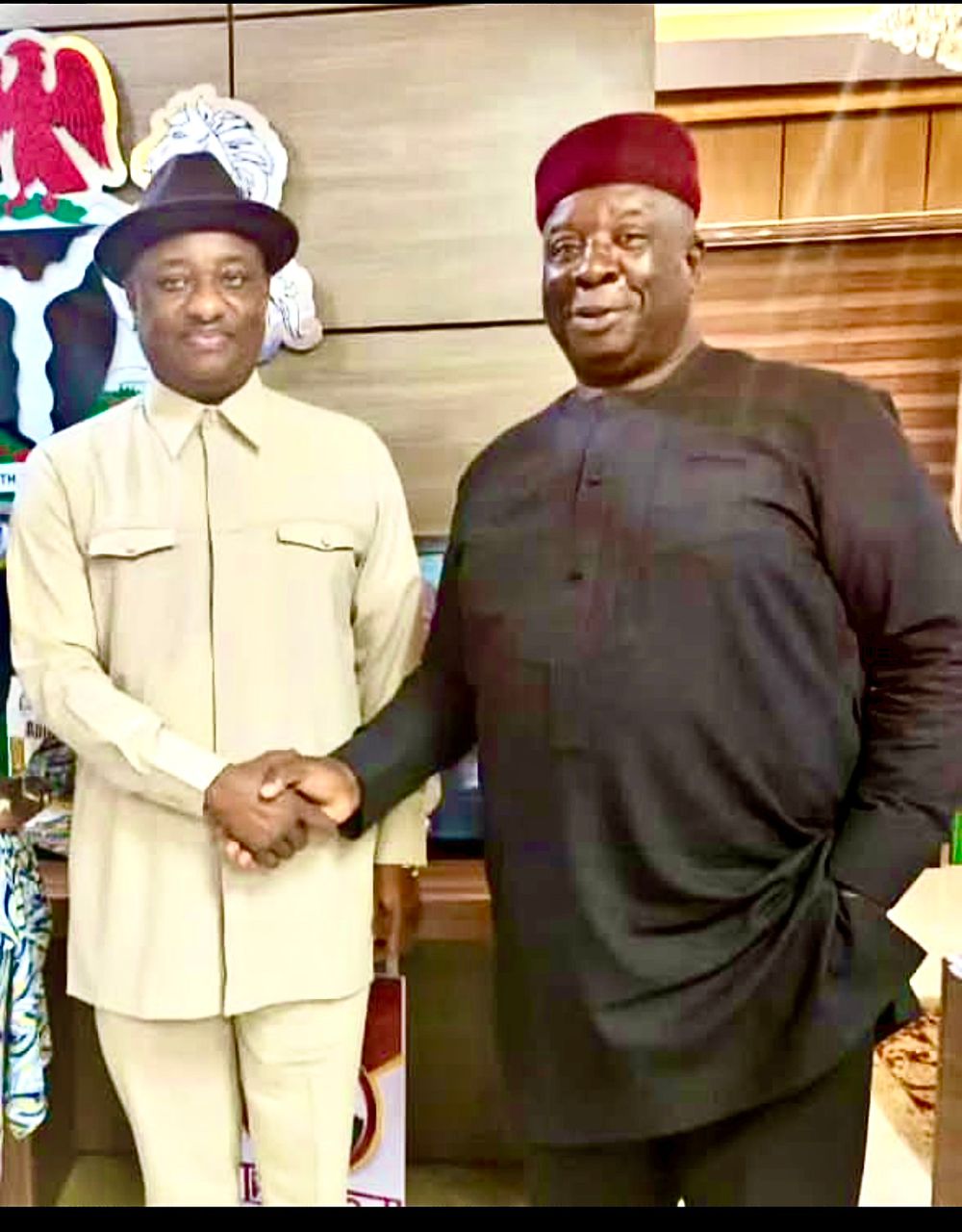Featured
Team Nigeria Dazzles in an Electrifying Day 2 at CAA U18/U20 Athletics Championship

Joel Ajayi
Under the watchful eyes of the Chairman of the National Sports Commission (NSC), Alhaji Shehu Dikko, the Director General, Hon. Bukola Olopade, and the Deputy Governor of Ogun State, Engr. Noimot Salako-Oyedele, Day 2 of the ongoing CAA U18/U20 African Athletics Championship lit up with Nigerian brilliance on home soil at the MKO Abiola Stadium in Abeokuta.
It was a clean sweep in the girls’ 100m U-18 final as Team Nigeria asserted its dominance sweeping all medals in the category. Miracle Ezechukwu blazed to gold in 11.88secs, as she was followed closely by Rosemary Nwankwo (11.96secs), captain of the Invited Junior Athletes at the 22nd National Sports Festival, while Miriam Jegede clinched bronze with 12.20secs, completing a historic podium takeover.
The momentum carried into the U-20 girls’ 100m final, where Nigeria bagged gold and silver. Chioma Nweke stormed to first place in 11.65secs, followed by Success Oyibu with 11.78secs.
Although Nigeria’s third finalist, Chiamaka Nwankwo, narrowly missed the podium, she showed great promise, finishing fourth in 11.98secs.
In the boys’ category, Nigeria kept the flag flying with two bronze medals. Clifford Igbigbidje clocked 10.89secs in the U-18 100m final, while John Caleb’s 10.61secs finish earned him bronze in the U-20 final. Both races were fiercely contested, with South Africa taking gold and silver in both events.
Capping off a thrilling day, Nigeria triumphed in the U-20 Mixed 4x400m Relay. In a race that swung back and forth, Nigeria’s anchor, Favour Onyah, held firm and surged ahead to secure gold after South Africa’s anchor stumbled near the finish. That victory sealed Nigeria’s third gold of the day, following the earlier wins in the girls’ 100m U-18 and U-20 events.
Dignitaries including CAA President Hamad Kalkaba Malboum, athletics legend Chief Segun Odegbami, Olympian Mary Onyali, and other key stakeholders were in attendance, joining thousands of spirited fans who turned out to witness the future of African athletics.
Featured
CELEBRATING A CENTURY-OLD CIVIL AVIATION SECTOR TRAJECTORY IN NIGERIA

This week, millions of Nigerians and others across the globe will join the Ministry of Aviation and Space Development under the irrepressible leadership of the Honourable Minister, Festus Keyamo(SAN),and all the notable Aviation sector stakeholders in and outside the country,in celebrating a century of Nigeria’s civil aviation history.
There is no doubt that under the present leadership of the Honourable Minister and within the short spell of time in his stewardship,he has consciously and intentionally embarked on a “silent revolution” for the industry with very veritable and laudable landmarks that have consistently grown the industry.
Some of these spirited efforts for instance have consequently led to trust restoration amongst international lessors, financier,any global partners.Of note also is assidiously working for the full domestication and implementation of the “Cape Town Convention Agreement” ,which gives Airlines access to modern fleets of competitive rates as well as enforcement of IDERA(Irrevocable Deregulation and Export Request Authorization).
Having well applauded these vital contemporary initiatives,it will also be germane to cast our minds in retrospect by taking a peep into our history over several decades to recognise some of the notable forebears in the industry whose impressionabl efforts cannot be overlooked,as they took the impetuous initiatives of breaking the ice at the nascent stage.
It will aptly corroborate the truism which says that… ” a journey of a thousand miles starts with one step”.
The above is vividly captured from a tribute by the First Republic Minister of Aviation Chief Mbazulike Amaechi at the funeral of late Igwe of Oba,HRH Peter Ezenwa(MFR) in 2018.
It states inter alia…”One significant thing I will say many people didn’t know is that the first indigenous airline that was to run in Nigeria was known as “STANDARD AIRLINE”.It was founded in 1966 by a company formed by Igwe Peter Ezenwa from Oba,and had on board,John Nwankwu from Abagana,Edward Ebo from Ezinifitte,(all from Anambra state),John Anyaehie from Nkwerre in Imo state,and lastly my very self Mbazulike Amaechi.
The five of us later acquired two brand new aircrafts,and had four pilots,namely;Unachievable,John Emma Ngwu and Felix Offor,who was to be the General Manager of the airline.
But just about the time for the take-off the crisis of the military takeover erupted in the North as the planes were on their way for delivery to us.In fact the bank handling the transaction was to allow the planes to be flown from the USA,but the news of the war broke out in 1967,the insurance company cabled for the cancellation of the deal as they will not be able to cover the risk cost of aircrafts being flown into war zone.
So,we asked the manufacturers to take the two aircrafts back to their country and hold on for six months with the hope of that the war will end within the requested time frame,but the war didn’t end as thought.We consequently asked for refund and they deducted some money and refunded the balance which was deposited at the London branch of African Continental Bank(ACB).
When the government took over the operations of ACB,we still hoped for the refund but unfortunately were disappointed that the Federal government took over the whole money and we lost everything.”
Further in line with our historical perspective,it will also be pertinent some of the later years reformists in the likes of Engr Onyereri and Harold Demuren who advertently sponsored some far reaching regulations that eventually steered the industry towards greater autonomy with the passage of the 2005 Civil Aviation Act,which I was also a prime participant of in my capacity as an Aviation sub chair in then House of Representatives.
As we mark this great century milestone,and with the clear evidential pathway set out by the current managers of the industry under the indomitable leadership of Honourable Minister, I do not see the sky posing any limitations as they say,but rather availing new vistas of limitless growth opportunities.
CONGRATULATIONS.
Hon Chidi Nwogu
Former member House of Representatives & presently Governing Council member
,African Aviation and Aerospace University,Abuja.
-

 Featured6 years ago
Featured6 years agoLampard Names New Chelsea Manager
-

 Featured6 years ago
Featured6 years agoFG To Extends Lockdown In FCT, Lagos Ogun states For 7days
-

 Featured6 years ago
Featured6 years agoChildren Custody: Court Adjourns Mike Ezuruonye, Wife’s Case To April 7
-

 Featured6 years ago
Featured6 years agoNYSC Dismisses Report Of DG’s Plan To Islamize Benue Orientation Camp
-

 Featured4 years ago
Featured4 years agoTransfer Saga: How Mikel Obi Refused to compensate me After I Linked Him Worth $4m Deal In Kuwait SC – Okafor
-
Sports3 years ago
TINUBU LAMBAST DELE MOMODU
-

 News12 months ago
News12 months agoZulu to Super Eagles B team, President Tinubu is happy with you
-
Featured6 years ago
Board urges FG to establish one-stop rehabilitation centres in 6 geopolitical zones
